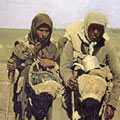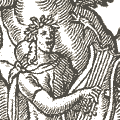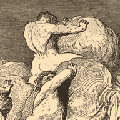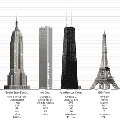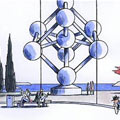Gisteren zijn in de Aleksandr Nevsky kathedraal in Sofia de slachtoffers van Batak door de Bulgaars Orthodoxe Kerk heilig verklaard. Batak is het Srebrenica (of het Katyn) van Bulgarije, maar bij ons is deze genocide nauwelijks bekend.
In april 1876 was het Zuid-Bulgaarse dorpje Batak het toneel van wreedheden. Zeker vijfduizend inwoners werden op gruwelijke wijze door de Ottomaanse bezetter vermoord. Voor het Russische broedervolk werd een militaire interventie noodzakelijk. De massamoord in Batak betekende in zekere zin het begin van de Russisch-Turkse oorlog. Zeven jaar geleden maakte ik met een vriendin uit Sofia een rondreis door haar land en we bezochten verschillende plaatsen die een rol hebben gespeeld in deze oorlog (1877-1878). In februari 1878 maakte de Vrede van San Stefano een eind aan de oorlog. Bulgarije kreeg na eeuwenlange Ottomaanse overheersing eindelijk zelfbestuur. Drie maanden later werd de Vrede van San Stefano tijdens het Congres van Berlijn herzien. Pas in 1908 zou Bulgarije een zelfstandig koninkrijk worden.
Voor Engeland lagen de Ottomaanse wreedheden van 1876 gevoelig. In de tweede helft van de negentiende eeuw stonden de Europese grootmachten in een gespannen verhouding met elkaar. Engeland en Frankrijk visten in de koloniale vijver en kwamen elkaar op onverwachte plekken in de wereld tegen. Het Duitse Keizerrijk mengde zich daar vanaf 1880 ook tussen. En dan had je Oostenrijk en Rusland die dezelfde belangen hadden op de Balkan. Rusland breidde zich steeds meer uit naar het Zuid-Westen en werd daardoor een bedreiging voor de Engelsen. In de Krimoorlog steunden Engeland en Frankrijk het Ottomaanse Rijk omdat ze doodsbang waren dat het van oorsprong christelijke Constantinopel in Russische handen zou vallen, zodat voor de Russische vloot de weg naar de Middellandse zee open zou komen te liggen. Nadat de Krimoorlog door Rusland verloren was, bleef met name Engeland goede betrekkingen met het Ottomaanse Rijk houden. Vooral de conservatieven koesterden de Ottomanen als bondgenoot tegen de Russen.
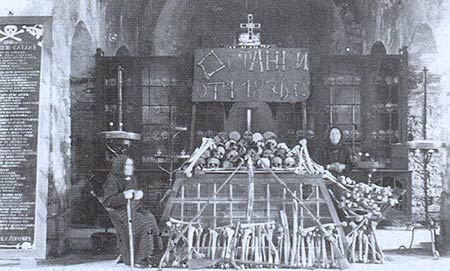
De massamoord in Batak bracht Engeland in grote verlegenheid tegenover zijn Ottomaanse bondgenoot. Eerst probeerden de conservatieven onder Disraeli de feiten te bagatelliseren, maar de liberalen onder Gladstone loeiden van verontwaardiging. Maanden later, op 22 augustus 1876, verscheen er in de Londense Daily News een stuk van de Amerikaanse journalist Januarius MacGahan, getiteld The Turkish Atrocities in Bulgaria: Horrible Scenes at Batak. Tot in de details beschrijft hij na een bezoek aan de onheilsplek en aan de hand van ooggetuigeverslagen wat er in Batak precies gebeurd is. Batak is in omvang het Srebrenica van de late negentiende eeuw, maar qua misdaad nog barbaarser, omdat vrouwen en kinderen en zelfs baby’s niet werden ‘ontzien’.
on the points of bayonets.
The reason is simple. When a Mohammedan has killed a certain number of infidels he is sure of Paradise, no matter
what his sins may be.
J.A. MacGahan in the Daily News
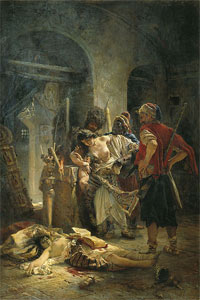 The advantage of killing children is that it can be done without danger, and that a child counts for as much as an armed man. Here in Batak the Bashi-Bazouks, in order to swell the count, ripped open pregnant women, and killed the unborn infants. As we approached the middle of the town, bones, skeletons, and skulls became more numerous. There was not a house beneath the ruins of which we did not perceive human remains, and the street besides was strewn with them. Before many of the doorways women were walking up and down wailing their funeral chant. One of them caught me by the arm and led me inside of the walls, and there in one corner, half covered with stones und mortar, were the remains of another young girl, with her long hair flowing wildly about among the stones and dust. And the mother fairly shrieked with agony, and beat her head madly against the wall. I could only turn round and walk out sick at heart, leaving her alone with her skeleton. A few steps further on sat a woman on a doorstep, rocking herself to and fro, and uttering moans heartrending beyond anything I could have imagined. Her head was buried in her hands, while her fingers were unconsciously twisting and tearing her hair as she gazed into her lap, where lay three little skulls with the hair still clinging to them.
The advantage of killing children is that it can be done without danger, and that a child counts for as much as an armed man. Here in Batak the Bashi-Bazouks, in order to swell the count, ripped open pregnant women, and killed the unborn infants. As we approached the middle of the town, bones, skeletons, and skulls became more numerous. There was not a house beneath the ruins of which we did not perceive human remains, and the street besides was strewn with them. Before many of the doorways women were walking up and down wailing their funeral chant. One of them caught me by the arm and led me inside of the walls, and there in one corner, half covered with stones und mortar, were the remains of another young girl, with her long hair flowing wildly about among the stones and dust. And the mother fairly shrieked with agony, and beat her head madly against the wall. I could only turn round and walk out sick at heart, leaving her alone with her skeleton. A few steps further on sat a woman on a doorstep, rocking herself to and fro, and uttering moans heartrending beyond anything I could have imagined. Her head was buried in her hands, while her fingers were unconsciously twisting and tearing her hair as she gazed into her lap, where lay three little skulls with the hair still clinging to them.How did the mother come to be saved, while the children were slaughtered? Who knows? Perhaps she was away from the village when the massacre occurred. Perhaps she had escaped with a babe in her arms, leaving these to be saved by the father; or perhaps, most fearful, most pitiful thing of all, she had been so terror-stricken that she had abandoned the three poor little ones to their fate and saved her own life by flight. If this be so, no wonder she is tearing her hair in that terribly unconscious way as she gazes at the three little heads lying in her lap.
Bron: attackingthedevil.co.uk
Januarius MacGahan was assigned as a war correspondent for the Daily News, and, thanks to his friendship with General Skobelev, the Russian commander, rode with the first units of the Russian Army as it crossed the Danube into Bulgaria. He covered all the major battles of the Russian-Turkish War, including the siege of Plevna and Shipka Pass. He reported on the final defeat of the Turkish armies, and was present at the signing of the treaty of San Stefano, which ended the war. He was in Istanbul, preparing to travel to Berlin for the conference that determined the final borders of Bulgaria, when he caught typhoid fever. He died on June 9, 1878, and was buried in the Greek cemetery, in the presence of diplomats, war correspondents, and General Skobelev. His body was five years later returned to the United States and reburied in New Lexington, and a statue was erected in his honor by a society of Bulgarian-Americans. MacGahan is still remembered in Bulgaria for his role in winning Bulgarian independence. A street in the capital, Sofia, is named for MacGahan, as is a square in the city of Plovdiv, and streets and squares in several other towns.
Bron: en.wikipedia.org
The Turkish Atrocities In Bulgaria [ The Bronx Times ]
Batak Massacre [ en.wikipedia.org ]







